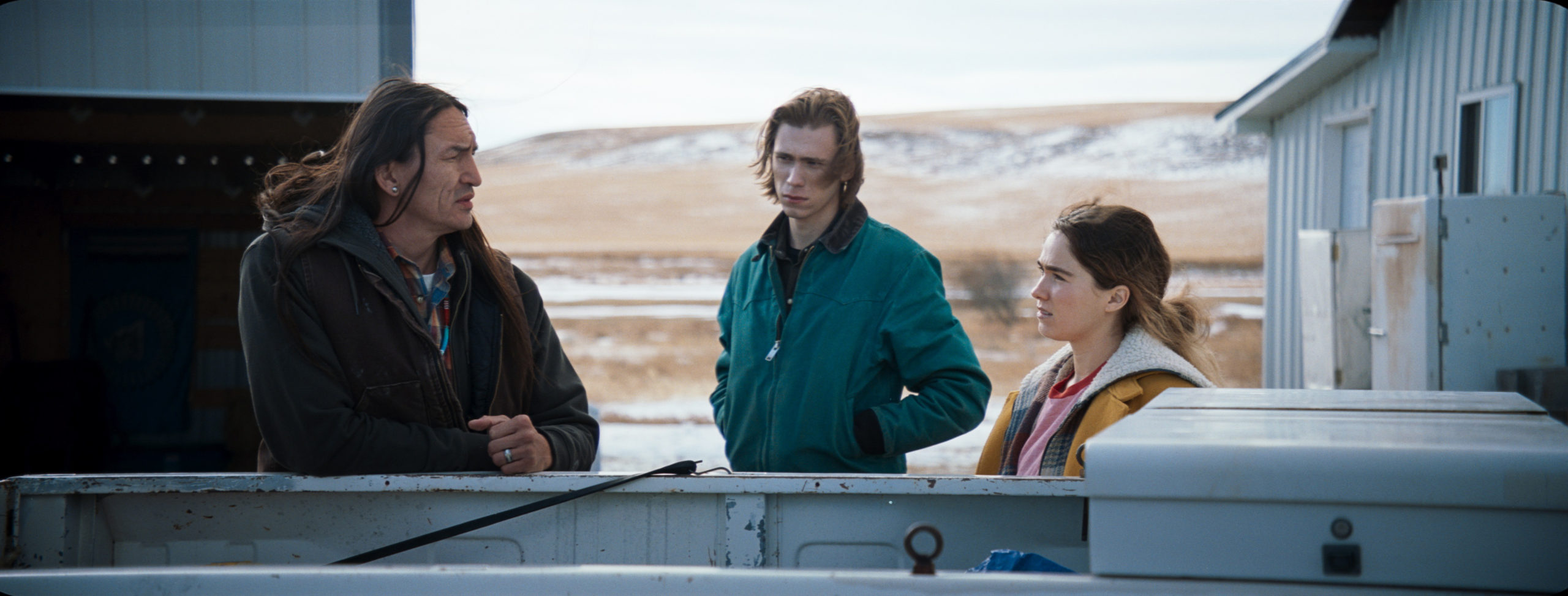Outside of Westerns, Montana is an overlooked place to tell some stories. Probably because, you know, people from Montana who end up in New York or Los Angeles need a quiet place to relax after the hustle and bustle of their jobs. The commonly phrased Big Sky Country contains within it a multitude of big emotions, stories, and characters, which Montana Story gives the city folk a brief glimpse into, as well as an immediate search for “AirBnB’s near Paradise Valley, MT.”
Even though his dad is on his deathbed, Cal’s (Owen Teague) strange reaction coming home certainly shows us he hasn’t been there in a long time. Paying Valentina (Kimberly Guerrero) and Ace (Gilbert Owuor) to care for his comatose father, Cal settles back into his old home, preparing for his father’s passing by paying the bills and preparing to sell the ranch, including putting down the family’s elderly horse, Mr. T. Out of the blue, Cal’s estranged, “thought gone forever” sister Erin (Haley Lu Richardson) returns a few days after Cal does, shocking them both into even deeper silence. Erin breaks the silence when she hears about Mr. T, and goes on a crusade to keep him alive by taking him back to her home.
Trust is at the core of Montana Story. Specifically, how to go about rebuilding trust. Cal and Erin clearly love each other, but its evident from their meeting that something happened to break that trust they had in one another. Cal, haunted by this, goes about the tricky proposition of trying to get Erin back in his life in someway. Scott McGehee and David Siegel, though born on the coasts, must have Midwestern relatives, because their script very adeptly understands how to break down barriers of those quiet “I don’t talk about my feelings” people. When someone you love hurts you that deeply, the only way to survive initially is to build layers of thick skin to prevent anything from getting in. You can’t go right to the traumatic hurtful past, you have to build to it, slowly. So Cal starts with inane details about what he’s doing with the ranch, or what his life is like today: pet ownership, engineering, etc. Because the hurt is so deep, Cal pauses in wait for response, but upon getting none from Erin, continues with anecdotes on his life, and makes his silence pauses longer. Eventually, to cut the awkward tension, Erin fills it with some random detail about herself, which Cal gently prods with simple descriptive follow up questions. One that initial barrier is broken, then the layers of jade/cynicism start to fall away.
But once you’re through the thick skin, you’re left with raw pain and emotion. Montana Story shows how people in that state are usually triggered by something to start an emotional spiral: a place, a stressful situation, an understanding sympathetic objective ear. It could be anything. The script’s slow build to this emotional climax is rough, harrowing stuff, but necessary to rebuild some of that lost trust from long ago. Kudos to Owen Teague and Haley Lu Richardson, who do amazing work in their characters’ emotional journeys. Teague puts the weight of guilt and longing on Cal’s shoulders, desperate to make up for past mistakes and lost time. And my favorite young actor today, Richardson, finds subtle layers to Erin’s pain, building to the emotional outpouring that’s nuanced and never overacted, but conveys years of trauma she has to unfurl and get past, to a new, better, normal.
As tough as some of Montana Story is, the movie is inevitably a hopeful tale. And an inspiring one too, showing how no hurt, no matter how painful, cannot be overcome, and love can go away, but it also can return in a new way. And maybe, just maybe, we might see the birth of Montana’s film Renaissance, at least in Paradise Valley, where they filmed this movie: maybe a slice of heaven on Earth.

